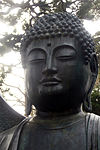
Back البوذية في الغرب Arabic Будизъм на Запад Bulgarian Buddhismus im Westen German Dificultades occidentales para definir el budismo Spanish Budism läänes Estonian Bouddhisme en Occident French בודהיזם במערב HE पश्चिमी देशों में बौद्ध धर्म Hindi Buddhizmus Nyugaton Hungarian Buddhisme di dunia Barat ID
| Part of a series on |
| Western Buddhism |
|---|
 |
| Part of a series on |
| Buddhism |
|---|
 |
Buddhism in the West (or more narrowly Western Buddhism) broadly encompasses the knowledge and practice of Buddhism outside of Asia, in the Western world. Occasional intersections between Western civilization and the Buddhist world have been occurring for thousands of years. Greek colonies existed in India during the Buddha's life, as early as the 6th century.[1] The first Westerners to become Buddhists were Greeks who settled in Bactria and India during the Hellenistic period. They became influential figures during the reigns of the Indo-Greek kings, whose patronage of Buddhism led to the emergence of Greco-Buddhism and Greco-Buddhist art.
There was little contact between the Western and Asian cultures during most of the Middle Ages, but the early modern rise of global trade and mercantilism, improved navigation technology and the European colonization of Asian Buddhist countries led to increased knowledge of Buddhism among Westerners. This increased contact led to various responses from Buddhists and Westerners throughout the modern era. These include religious proselytism, religious polemics and debates (such as the Sri Lankan Panadura debate), Buddhist modernism, Western convert Buddhists and the rise of Buddhist studies in Western academia.
During the 20th century, there was growth in Western Buddhism due to various factors such as immigration, globalization, the decline of Christianity and increased interest among Westerners. The various schools of Buddhism are now established in all major Western countries making up a small minority in the United States (1% in 2017), Europe (0.2% in 2010), as well as in Australia (2.4% in 2016) and New Zealand (1.5% in 2013).[2][3][4][5]
- ^ Batchelor, Stephen (15 October 2021). The Awakening of the West: The encounter of Buddhism and Western culture. Echo Point Books & Media, LLC. pp. xv.
{{cite book}}: CS1 maint: date and year (link) - ^ Cox, Daniel; Jones, Ribert P. (9 June 2017). America’s Changing Religious Identity. 2016 American Values Atlas. Public Religion Research Institute.
- ^ Pew Research Center, http://www.pewforum.org/2015/04/02/buddhists/ Archived 2017-04-29 at the Wayback Machine
- ^ 2071.0 - Census of Population and Housing: Reflecting Australia - Stories from the Census, 2016. https://web.archive.org/web/20170919010053/http://www.abs.gov.au/ausstats/abs@.nsf/Lookup/by%20Subject/2071.0~2016~Main%20Features~Religion%20Data%20Summary~25
- ^ "Table 28, 2013 Census Data – QuickStats About Culture and Identity – Tables". Archived from the original on 22 November 2017. Retrieved 27 November 2018.